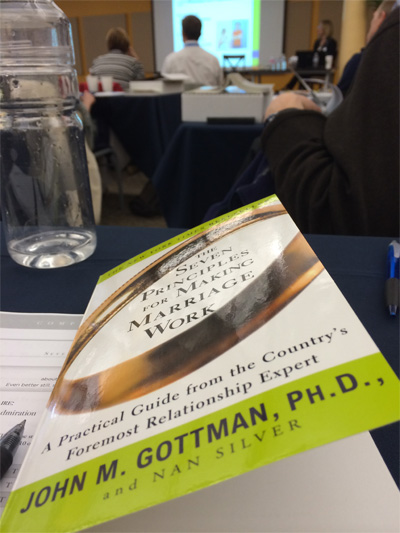I get a lot of grief for being on sabbatical. From friends. From extended family. From the children to whom I gave birth 14 and 18 years ago. Even from colleagues, although mostly those who have not yet taken a sabbatical or are not eligible for one. Some of the razzing comes – deservedly – from Scroll readers who read my “10 Things I Hate” blog about this year away from regular work obligations. Hellooo … it was supposed to be funny. Yes, sabbaticals are magical times of crazy, productive thinking, writing and gaining perspective on the work and institution we love so much!

Carol Bruess
Last month, my sabbatical work took me to a place I’ve had on my professional bucket list for more than two decades. It’s a sacred place where relationship researchers, educators and therapists came together to learn about the science of making relationships work. And we learned from not just any old run-of-the-mill academic, but from a team that works with the best relationship researcher in the world. Literally. Not exaggerating.
His name? Dr. John Gottman. His research? Forty-plus years of longitudinal data with couples, examining what makes marriage work. His substantiated claim? The ability to predict divorce with 94 percent accuracy by observing couples communicating for just minutes. Oh, and he not only predicts divorce, but he – thank goodness –has figured out how couples must behave (the dissolution-prevention, happiness-inducing behaviors) if they want to circumvent the “my marriage crumbled” reality.
His institute? The Gottman Relationship Institute at the University of Washington, where I and more than 100 like-minded colleagues participated in an intensive workshop on the science of relationships.
My goal? A deep-dive into Gottman’s methods, findings and his research team’s mission to publish and educate about the most credible, important and powerful lessons for creating and sustaining long-term, healthy relationships.
While I have taught Gottman’s research in my classes for two decades, I sat in awe at the workshop, each hour feeling like mere minutes. My giddy researcher-educator self was pumping with happy adrenaline. I finally was getting to ask some of my burning questions about the research, its implications and the many ways it can be translated. I was most pumped up knowing I would bring it all back to St. Thomas, feeling inspired to develop new research projects and share with students. Oh, and with everyone who will listen (Scroll readers!) because these principles have application with everyone in our lives: colleagues, friends, roommates, family . . . and even strangers. We all thrive on positive interactions.
Below are the first two of Gottman’s Seven Principles for Making Marriage Work, also the title of his best-selling book on this research. The other five principles will appear in upcoming Scrolls. For now, how are you doing on these?

Dr. Carol Bruess has taught Dr. John M.Gottman’s research in her classes for two decades.
Principle No. 1: “In Knowledge There Is Strength.” Couples who weather the storms of married life have what Gottman calls “detailed love maps.” A love map is the place in your brain where Gottman’s research suggests you store all relevant information about your partner’s life. Or, in other words, the marriage masters (versus the marital disasters) make sure they have plenty of cognitive room for their marriage. How can you refresh or update the love map of your partner? Ask questions and then want to hear (and remember) the answers. Such as: “Honey, what are you fearing the most in life right now?” or “Who are two people you most admire?” We tend to know these and a hundred other personal things about each other early in marriage. But over time, couples tend to lose sight of each other, and without a detailed love map they also are likely to lose sight of their marriage. Luckily, love maps are free and you can work on yours starting right now. It just takes intention.
Principle No. 2: “Nurture Fondness and Admiration.” Here’s a truth about humans: we like to be admired and appreciated. In long-term relationships, we tend to do less and less of it while doing more of what Gottman has pinpointed as the relational cancers: expressing contempt and defensiveness. It’s natural for humans to get defensive when they are criticized and to act with contempt when they are angry. But it’s bad for relationships. To fill your relational and emotional bank account, here’s the antidote to contempt: fan the flames of positive feelings about your partner and let him or her know about it. Start by writing a three things you appreciate about your partner. Pick from Gottman’s pre-determined list if you’d like: “You, partner, are: Loving. Sensitive. Brave. Intelligent. Truthful. Strong. Energetic. Creative. Fun. Interesting. Funny. Considerate. Resourceful. Expressive. Careful. Reliable. Kind. Practical. Gentle. Witty. Tender. Powerful. Flexible." Make up others! And share them over dinner tonight. Then again next week … and again soon thereafter. Make it a ritual, and your relationship likely will last for a long time.
Epilogue: If you want to read the more about Gottman’s studies, get a copy of the seminal What Predicts Divorce? The Relationship Between Marital Processes and Marital Outcomes (1993, Psychology Press). My other Gottman favorites: The Relationship Cure (2002, Harmony Press) and The Science of Trust: Emotional Attunement for Couples (2011, W. W. Norton Press).
And if you invite me to your wedding or anniversary party, expect to receive a copy of one of the above (plus a bottle of fine wine to sip while you read and discuss with your partner).






